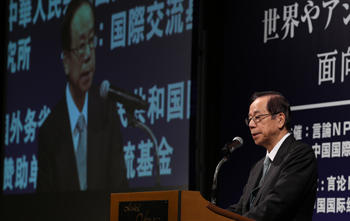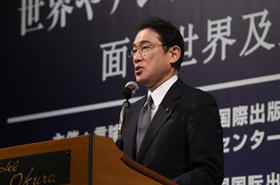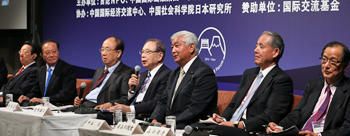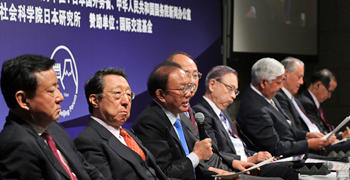
The 12th Tokyo-Beijing Forum kicked off its two-day high-level dialogue Sept. 27 in Tokyo on the theme of "Sino-Japanese cooperation for Asian and world peace and development."
Jointly organized by the China International Publishing Group (CIPG) and The Genron NPO, a Japanese not-for-profit independent think tank, the forum focused mainly on the issues of peace and development in East Asia, and the world economy, as well as the desired modality of Japan-China cooperation in a new era.
More than 600 diplomats, policymakers, business executives, media representatives and experts on Sino-Japanese relations took part in the forum, acclaimed by the organizers as the most important and influential private-sector platform for dialogue between Japan and China.
In the first-day plenary session, moderated by Yasushi Kudo, president of The Genron NPO, former Japanese Prime Minister Yasuo Fukuda delivered the keynote speech.
Noting that Japan-China relations have visibly worsened in the last five to six years, Fukuda said he praised the meeting between Chinese President Xi Jinping and Japanese Prime Minister Shinzo Abe on the sidelines of the G-20 Hangzhou Summit in early September, at which the top leaders of the two countries made clear-cut commitments to the improvement of bilateral ties.

"Today, it is urgently imperative for both countries not to do anything that could worsen the strained relations further. In order to create an environment in which both countries restore mutual trust and a sense of affinity in a quiet manner, I would venture to propose a freeze on the status quo (of the bilateral relations)," Fukuda said.
Fukuda's remarks were taken by other Japanese delegates to mean that both sides should refrain from doing anything or saying anything that might cause negative reactions in the other country.

Following Fukuda's speech, another keynote address was delivered by Tang Jiaxuan, a former Chinese foreign minister and chairman of the China-Japan Friendship Association. Tang warned that the current "unhealthy" Sino-Japanese relations are having adverse effects on the whole of Asia, politically and economically.
In reference to the accords reached between Xi and Abe at the G-20 summit, Tang said that the four political documents, finalized since the normalization of bilateral diplomatic relations in 1972, and the four-point principled agreement signed in November 2014, leading to the first formal Xi-Abe meeting later the same month, should be regarded as the established guidelines for the betterment of bilateral relations.
Despite the top leaders' agreement, Japan's intentional engagement in, or interference into, the South China Sea issue only complicates matters, he warned, adding that all these new issues impede improvement in bilateral ties and should be prevented from developing.
At the same time, Tang voiced hope for the betterment of bilateral ties by facilitating people-to-people exchanges at various levels and areas, including local governments, students, grass-roots groups and especially media circles.

During the opening session, in his brief remarks as a guest speaker Japanese Foreign Minister Fumio Kishida announced that the Japanese government will officially implement measures to further ease visa requirements for Chinese visitors to Japan, starting Oct. 17, as part of his country's efforts to promote people-to-people exchanges between the two countries.
Chinese Foreign Minister Wang Yi was informed of the plan to relax visa requirements when Kishida met him in Beijing in late April, Kishida said.
Japan's foreign minister also said that both countries should make the most of the upcoming 45th anniversary next year of the normalization of diplomatic relations and the 40th anniversary in 2018 of the conclusion of the Japan-China peace and amity treaty to improve the sour ties dramatically.
Other speakers were Yasushi Akashi, chairman of the International House of Japan, who heads the forum's Japanese Executive Committee, Jiang Jianguo, director of China's State Council Information Office, CIPG President Zhou Mingwei and Chinese Ambassador to Japan Cheng Yonghua.

Later, the plenary session proceeded to a panel discussion on the main topic of the forum, co-moderated by Yuji Miyamoto, a former Japanese ambassador to China, and Zhao Qicheng, dean of the School of Journalism and Communication at Renmin University of China.
The panelists from the Japanese side were Gen Nakatani, a former Japanese defense minister, Yasuchika Hasegawa, chairman of Takeda Pharmaceutical Co., Ltd., and Hirohide Yamaguchi, chairman of the Advisory Board, Nikko Research Center Inc. and a former deputy governor of the Bank of Japan. The Chinese panelists were Chen Jian, a former Chinese ambassador to Japan, Wei Jianguo, a former vice minister of commerce and vice chairman of the China Center for International Economic Exchanges, and Fan Gang, vice president of the China Society of Economic Reform (CSER).

The six panelists exchanged candid, and sometimes blunt, words on sensitive issues, including the recent flight of eight Chinese warplanes over the strait between Okinawa's main island and Miyako Island, China's rebuttal to the ruling of the Permanent Court of Arbitration on July 12 in favor of the Philippines in the case Manila brought against Chinese actions in the South China Sea, North Korea's nuclear development, the decline in bilateral trade and economic relations, the stagnation of the world economy since the 2008 Lehman crisis, and the slow progress in structural economic reforms in Japan and China, among others.
While adhering to Beijing's official stances on these disputable issues, the Chinese panelists acknowledged that Japan and China should cooperate to solve regional and global issues as the world's second- and third-largest economies.
They also argued that China's emergence as a superpower should not be taken negatively by Japanese but rather be accepted as providing new opportunities for Japan to co-prosper.

With the keynote remarks by the six panelists and brief exchanges of words among them, the plenary session came to a close, to be followed in the afternoon by five breakout sessions -- politics/diplomacy, security, economy, media and a special topic on people-to-people exchanges, the summary reports of which panelists presented at the outset of the second day and final plenary session of the forum Sept. 28.
Post a comment